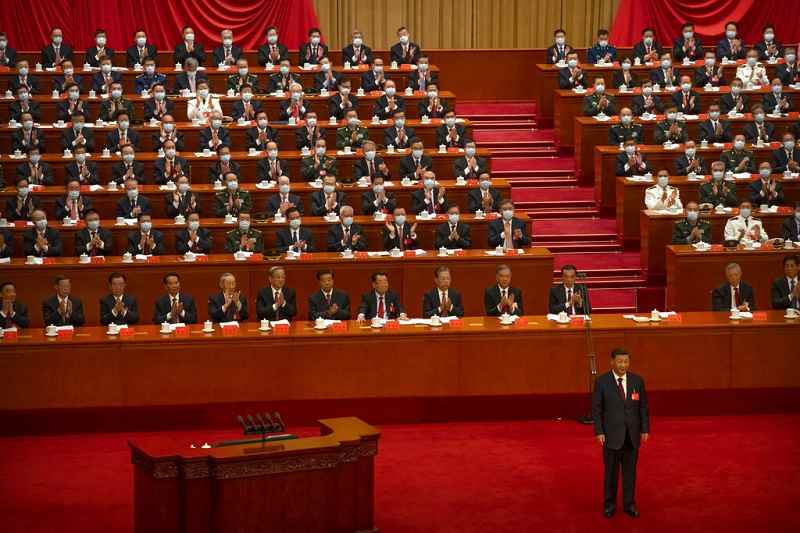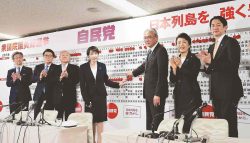
Delegates applaud after a speech by Chinese President Xi Jinping during the opening ceremony of the 20th National Congress of China’s ruling Communist Party at the Great Hall of the People in Beijing on Sunday.
16:22 JST, October 17, 2022
Xi Jinping, the general secretary of the Chinese Communist Party, expressed his determination to unify Taiwan with China in unusually strong terms Sunday in his political report at the 20th Party Congress. Xi also indicated that given the prolonged confrontation with the United States, he will promote a policy of doing everything possible to make China a strong nation with a strong military.
The United States is poised to counter China’s moves by strengthening its involvement in the Indo-Pacific region, and tensions are likely to rise in the days ahead.
Sustained applause
Xi, who is also the president of China, particularly focused on the Taiwan issue early in his political report.
“Faced with gross provocations by forces seeking ‘Taiwan independence’ and interference by outside forces in Taiwan affairs, we have demonstrated our resolve and powerful ability to safeguard our sovereignty and territorial integrity,” Xi said.
In response to the visit to Taiwan in August by U.S. House Speaker Nancy Pelosi, China conducted the largest-ever military drills to counter the United States and Taiwan. Xi touted this as an achievement of his second term in office.
Toward the end of the speech, he again referred to the Taiwan issue, saying, “Resolving the Taiwan issue is a matter for Chinese people themselves and must be resolved by Chinese people alone,” thereby rebuffing U.S. involvement.
When he indicated his resolve to achieve unification with Taiwan by referring to the option of even using “force,” he drew about 25 seconds of sustained applause from delegates at the venue.
The political report that the general secretary delivers at the party congress, held every five years, is the most authoritative policy speech under the CCP system. At the previous 19th Congress in 2017, Xi did not use the term “force” regarding Taiwan in his address.
During his third term, Xi will undoubtedly aim to maximize the country’s ability to realize national reunification through the use of force. A Chinese military source said definitely, “We will accelerate our war preparations in response to the latest political report.”
Self-confidence
Xi is confident that during his two five-year terms in office, he has built up China’s national power to be comparable to that of the United States. In his political report, he said, “China’s international influence has risen markedly.” However, Xi feels strong alarm that the confrontation with the United States over Taiwan and other issues will inevitably spill over to various areas and last for a protracted period.
Xi devoted more time to “national security” than at the previous congress, stating that “the holistic view of national security must be carried out unswervingly, and national security and social stability must be ensured.” The holistic approach to national security is a concept that the Xi administration has been emphasizing in recent years, and it covers not only the military, but also the economy, culture, society, science and technology, information, resources, and other aspects of national security.
Xi cited such areas as the security of the regime, systems, ideology, food, and supply chains as national security areas to be safeguarded. “We will build up national security capabilities,” he stressed
Bearing in mind that the administration of U.S. President Joe Biden is moving ahead with decoupling the United States from China over key technologies related to national security, Xi also showed his policy of “holding fast to being self-reliant and making a strong nation in science and technology,” while stating that he would “strengthen the country’s science and technology, and industrial capabilities for national defense.”
He also suggested that he would continue pursuing “military-civilian fusion,” which links cutting-edge civilian technology to the military build-up.
An official related to the CCP said “Xi has shown his willingness to make an all-out effort to confront the United States.”
Signs of decline
However, there are signs of decline in China’s national strength. Chinese society is rapidly graying, with the number of newborn babies failing to increase in recent years due to such factors as the growing burden of educational costs.
The economy, which has supported the one-party rule system, is also slowing down, while the country’s zero COVID policy, which strictly regulates the behavior of residents to prevent the spread of infections, is adding to the country’s stagnation.
As a result of its unilateral maritime advances in the East and South China Seas and its repeated use of diplomatic bullying to economically intimidate countries with which it has political disputes, the global community is more wary than ever toward China.
The Biden administration is pressing ahead with its Indo-Pacific strategy in a manner that deepens cooperation with its allies and friends, hastening the building of an international network to curb China. Meanwhile, the Xi administration is attempting to push forward a policy of making China a strong nation with a strong military, while facing concerns both at home and abroad.
Top Articles in World
-

China Eyes Rare Earth Foothold in Malaysia to Maintain Dominance, Counter Japan, U.S.
-

Israeli Ambassador to Japan Speaks about Japan’s Role in the Reconstruction of Gaza
-

North Korea Possibly Launches Ballistic Missile
-

Chinese Embassy in Japan Reiterates Call for Chinese People to Refrain from Traveling to Japan; Call Comes in Wake of ¥400 Mil. Robbery
-

Pentagon Foresees ‘More Limited’ Role in Deterring North Korea
JN ACCESS RANKING
-

Japan Institute to Use Domestic Commercial Optical Lattice Clock to Set Japan Standard Time
-

Man Infected with Measles May Have Come in Contact with Many People in Tokyo, Went to Store, Restaurant Around When Symptoms Emerged
-

China Eyes Rare Earth Foothold in Malaysia to Maintain Dominance, Counter Japan, U.S.
-

Israeli Ambassador to Japan Speaks about Japan’s Role in the Reconstruction of Gaza
-

Australian Woman Dies After Mishap on Ski Lift in Nagano Prefecture
























